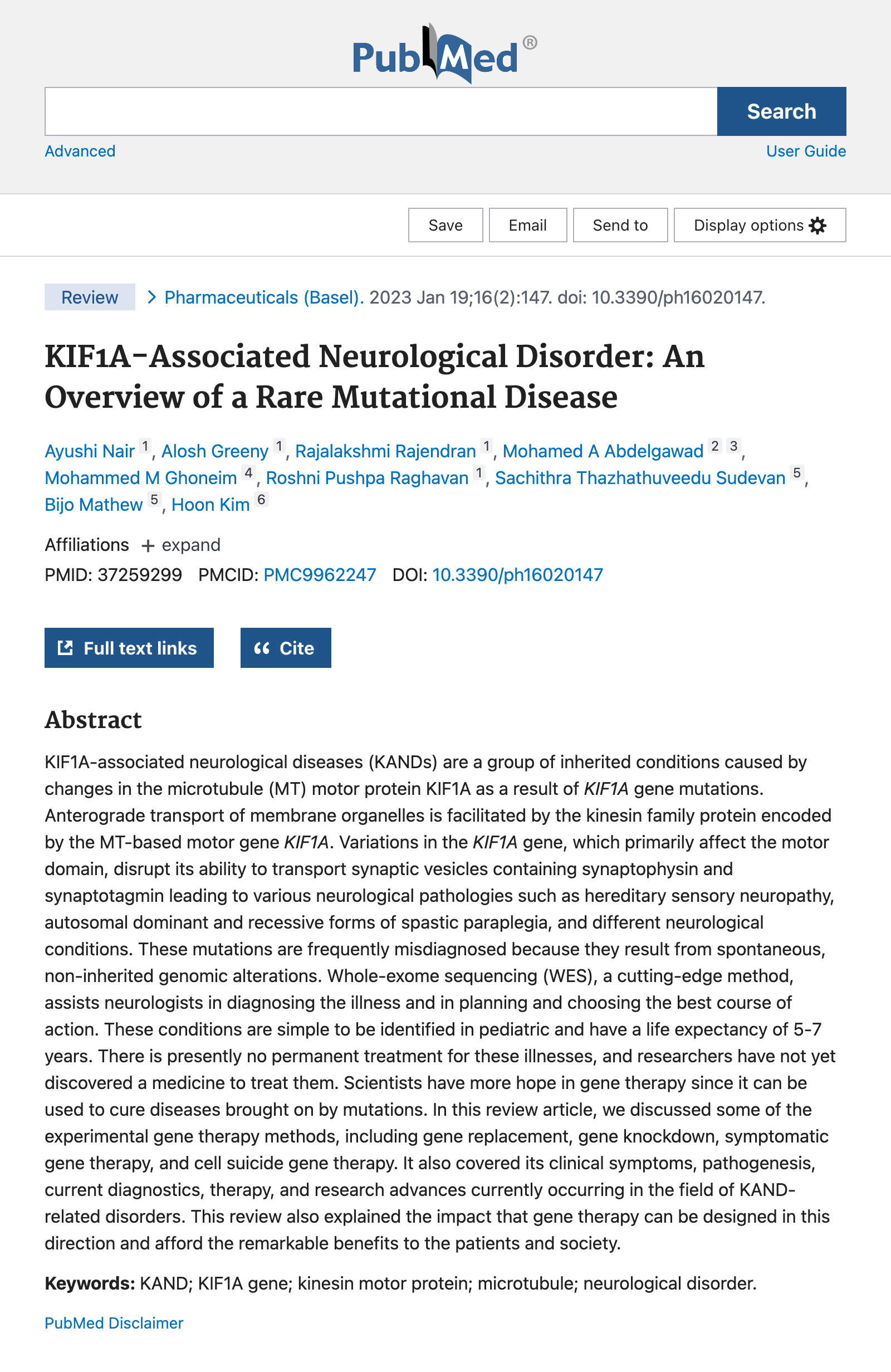KIF1A research summary
KIF1A Australia Foundation – webpage content – https://kif1a.au/research/
Murdoch Children’s Research Institute (MCRI) – KIF1A-Associated Neurological Disorder (KAND) research program
Murdoch Children’s Research Institute (MCRI) is at the forefront of research into childhood dementia, also known as KIF1A-Associated Neurological Disorder (KAND). Our goal is to accelerate the diagnosis and treatment of KAND leveraging advanced genetic technologies to identify specific variants rapidly and more accurately. We will ensure earlier and more precise diagnosis for affected individuals and allow both timely interventions and better management.
MCRI is one of the few institutes in Australia with in-house capacity to create stem cells from an affected child, genetically edit their ‘cell lines’ to correct the variant, and examine them to understand disease mechanisms and identify new treatments.
Leading the charge

Dr. Simran Kaur, is leading Australia’s first KAND research program in collaboration with national and international collaborators to accelerate research into KAND. The team hopes that by better understanding disease pathophysiology, we can identify disease biomarkers and new therapies, driven by cutting-edge stem cell technology These advances will improve long-term health outcomes for this vulnerable group of children and may potentially offer unprecedented and life-changing opportunities for individuals and families affected by KAND.
The team is driven by four foundational pillars: basic science, translational science, community engagement and awareness and program sustainability. Her vision is to co-design and advance this program in close partnership with KAND families, ensuring their voices are at the heart of every initiative.
- Basic science: To deepen our comprehension of the biological mechanisms underlying the clinical manifestations of KAND.
- Translating science into clinical practice: To ensure scientific advancements have a meaningful impact on KIF1A community, leading to improved quality of life and better health outcomes for KAND individuals.
- Community engagement: To integrate priorities and perspectives of KAND individuals and families at every step of research initiatives.
- Program sustainability
A key focus will be ensuring the sustainability of the research program. To support our ambitious research agenda, securing funding is essential. The team will continue to actively pursue grant opportunities and seek philanthropic support to advance research into KAND.
Research goals
Dr. Kaur and the team lead a dynamic research program with both short-term objectives and long-term vision. The following highlights some of their current projects, as well as future initiatives they are eager to pursue. Additional funding is essential to bring these upcoming projects to life.
Short-term goals
We’re investigating whether existing, approved drugs can help manage KAND symptoms. Our researchers will look at whether existing FDA approved drugs for other conditions could potentially help rescue KIF1A action in the brain of affected children. (In progress)
Additionally, we are aiming to improve the quality of life of families by:
- Studying and improving speech and language in KIF1A-Associated Neurological Disorder individuals (completed. In process of dissemination through publications and factsheets)
- Understanding lived experiences of families (in progress)
- Developing educational materials and creating awareness regarding KIF1A-Associated Neurological Disorder in our community (in progress)
- Creating a network of researchers and clinicians with expertise in KIF1A-Associated Neurological Disorder in Australia (in progress)
Medium-term goals A
Failing effective treatments in existing drugs, our researchers will work to develop new treatments and compounds to specifically target the dysfunctional protein that causes KAND.
Long-term goals
The ultimate aim is to cure KAND through gene therapy. This therapy would see the ‘broken’ KIF1A replaced with a healthy version, helping to reverse the dementia-like symptoms and help young affected individuals gain back their motor skills, eyesight, and more.
KIF1A-associated neurological disorder (KAND)
What is KIF1A-associated neurological disorder (KAND)?
KIF1A-associated neurological disorder (KAND) is a genetic disorder. Common KAND characteristics include motor disorders, intellectual disability, visual impairment, brain changes and seizures.1-4
KAND is caused by pathogenic or likely pathogenic variants in the KIF1A gene. The KIF1A gene codes for a protein called kinesin family member 1a. This protein is involved in transportation in the nervous system, including the brain.5 There are many different types of KIF1A variants that can cause KAND. This means that individuals with KAND have a broad range of characteristics associated with the disorder.3
The information on this website pertains to KAND that is autosomal dominant. This means that individuals have one spelling mistake in one of their two copies of the KIF1A gene, which in turn affects the kinesin family member 1a protein’s ability to transport.
